Proven Methods to Build Resilient Data Leadership
In times of uncertainty, your ability to lead with resilience determines how effectively your organization navigates challenges. Resilient data leadership empowers you to transform adversity into opportunity by leveraging data as a strategic asset. When crises arise, leaders like you must act decisively, ensuring stability and clarity. Studies reveal that organizations with robust data strategies achieve 54% better outcomes. By fostering adaptability and aligning data initiatives with business goals, you can inspire confidence and drive impactful decisions. The question remains: How will you build resilient data leadership to thrive in challenging times?
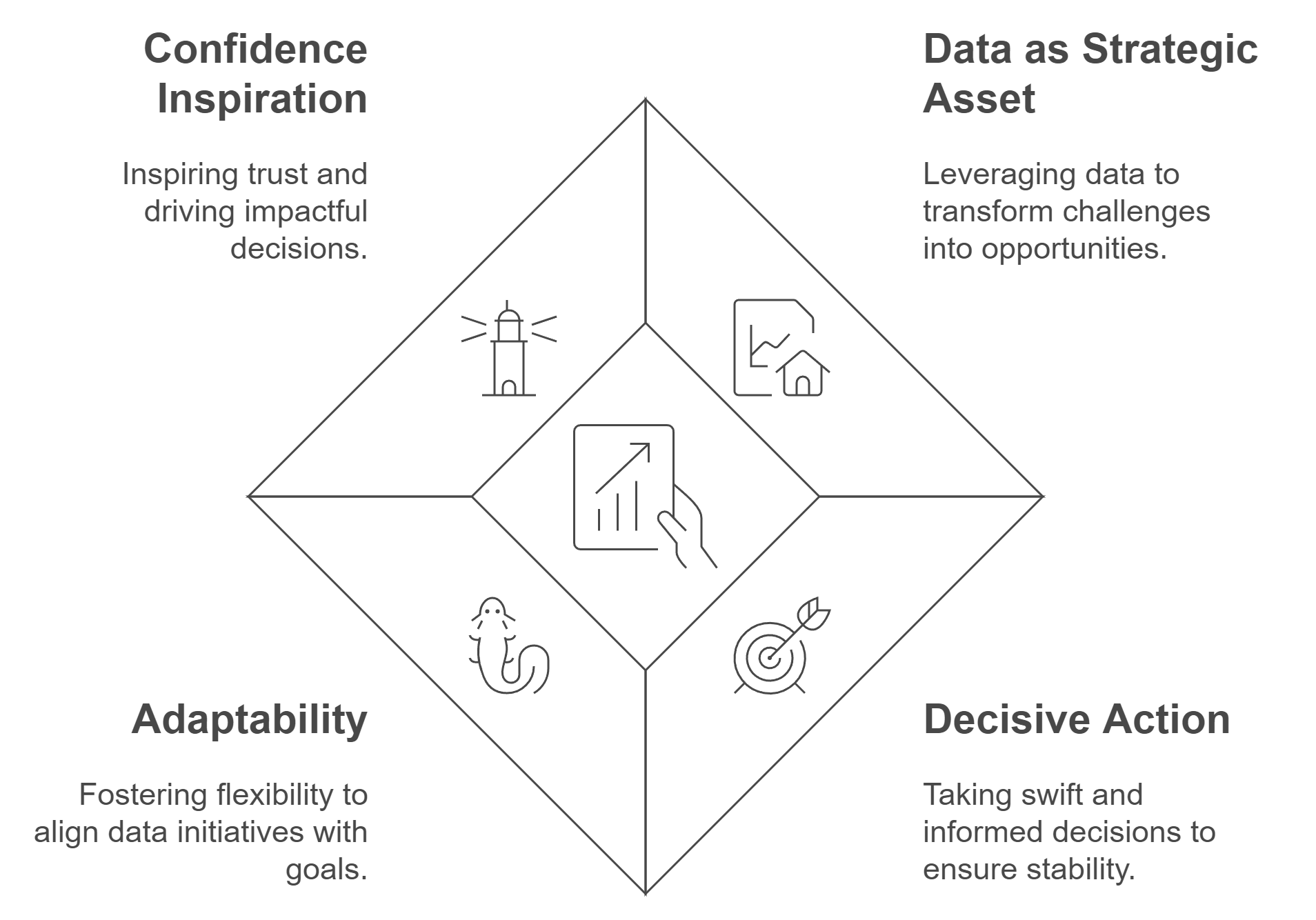
Key Takeaways
Embrace adaptability: Foster a culture that encourages innovative thinking and flexible processes to navigate challenges effectively.
Leverage data-driven decision-making: Utilize real-time analytics to guide your decisions and empower your team with the skills to interpret data effectively.
Prioritize clear communication: Establish structured channels for information flow to maintain stability and trust during crises.
Promote collaboration: Involve your team in decision-making processes to enhance morale and strengthen unity in challenging times.
Invest in continuous learning: Conduct reviews post-crisis to integrate lessons learned into future strategies, ensuring ongoing improvement.
Implement proactive risk management: Identify vulnerabilities and develop contingency plans to prepare your organization for potential challenges.
Cultivate a resilient mindset: Encourage your team to view challenges as opportunities for growth, fostering a culture of resilience and confidence.
Understanding Resilient Data Leadership
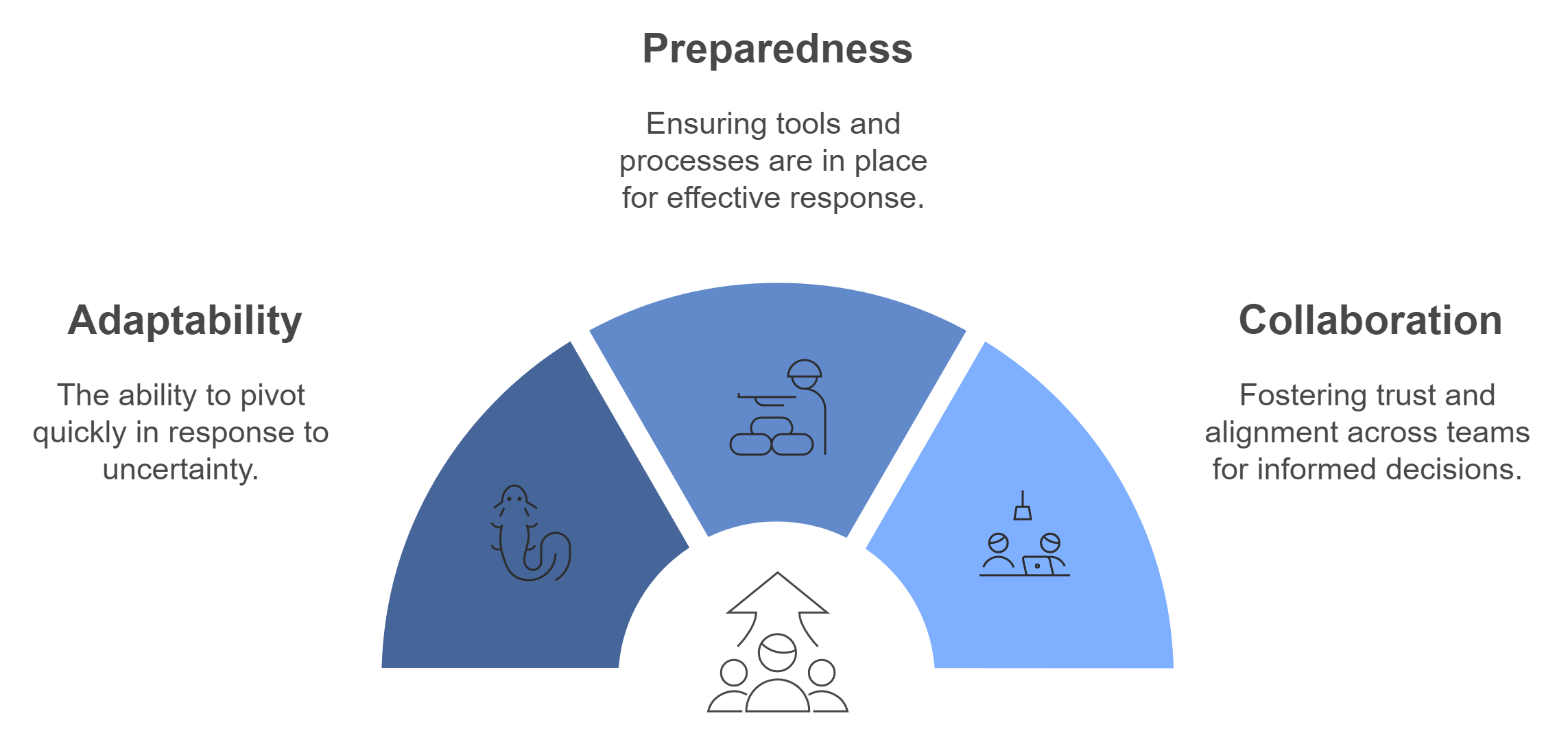
Defining Resilient Data Leadership
Key characteristics and importance in modern organizations.
Resilient data leadership is the ability to guide your organization through challenges by leveraging data as a strategic tool. It combines adaptability, decisiveness, and a forward-thinking mindset. As a leader, you must ensure that data becomes more than just numbers—it must serve as a foundation for impactful decisions. This approach empowers you to navigate crises with clarity and confidence.
Key characteristics of resilient data leadership include adaptability, preparedness, and a focus on collaboration. Adaptability allows you to pivot quickly when faced with uncertainty. Preparedness ensures that your team has the tools and processes to respond effectively. Collaboration fosters trust and alignment across teams, enabling faster and more informed decision-making.
Modern organizations thrive when leaders embrace resilience. For example, Satya Nadella transformed Microsoft by focusing on cloud computing and open collaboration. His leadership demonstrated how resilience and innovation can drive success, even in competitive markets. By adopting these traits, you can position your organization to excel in any situation.
The Role of Leadership in Times of Crisis
How resilient data leadership ensures stability and informed decision-making.
Leadership in times of crisis demands clarity, quick thinking, and a commitment to stability. Resilient data leadership equips you to make informed decisions, even when information is incomplete. By relying on data-driven insights, you can reduce uncertainty and guide your team toward solutions.
During a crisis, your ability to maintain stability becomes critical. Clear communication and decisive action inspire confidence among your team and stakeholders. For instance, Lee Iacocca saved Chrysler by implementing bold strategies like cutting costs and launching innovative products. His leadership showcased how resilience and data-backed decisions can turn adversity into opportunity.
To ensure stability, focus on creating a centralized data strategy. This approach streamlines processes and enhances agility, allowing you to respond faster. Additionally, prioritize transparency by sharing insights with your team. Open communication builds trust and fosters a sense of unity, even during challenging times.
Resilient data leadership transforms crises into opportunities for growth. By embracing adaptability, fostering collaboration, and leveraging data effectively, you can lead your organization through uncertainty with confidence and purpose.
Challenges Faced by Data Leaders During Crises
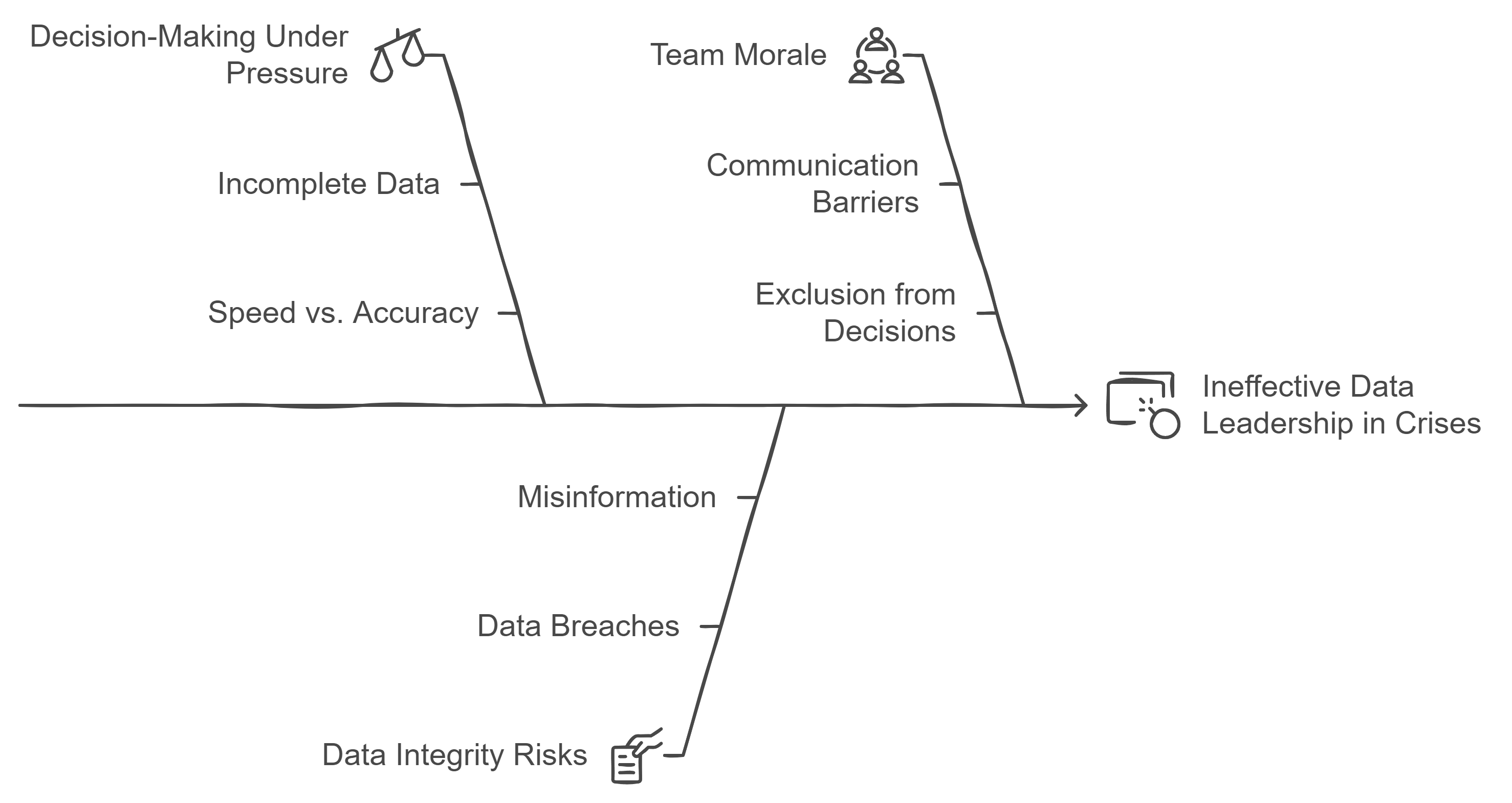
Decision-Making Under Pressure
Balancing speed and accuracy with incomplete data.
In a crisis, you often face the daunting task of making decisions with limited or incomplete information. The pressure to act swiftly can clash with the need for accuracy, creating a delicate balancing act. As a data leader, your ability to navigate this challenge defines your effectiveness. For example, during global disruptions, many organizations struggled to interpret rapidly changing data. This led to delays in decision-making or, worse, incorrect conclusions.
To overcome this, focus on prioritizing actionable insights over perfection. Establishing a centralized data task force can streamline processes and ensure that critical information reaches decision-makers quickly. According to a survey, senior leadership acknowledges the importance of such centralized efforts during crises. By fostering a culture of resilience, you can empower your team to act decisively, even when uncertainty looms.
Maintaining Preparedness and Data Integrity
Addressing risks like data breaches and misinformation.
Maintaining preparedness is essential for safeguarding your organization’s data integrity during crises. Data breaches and misinformation pose significant threats, especially when systems are under stress. A survey revealed that over 25% of senior IT professionals doubted their company leaders’ commitment to data protection. This highlights a critical gap in preparedness that can leave organizations vulnerable.
You must take proactive steps to mitigate these risks. Implement robust security protocols and conduct regular audits to identify vulnerabilities. Crisis leadership training can also equip your team with the skills needed to respond effectively to emerging threats. By prioritizing preparedness, you not only protect your organization but also build trust among stakeholders.
Team Morale and Collaboration
Overcoming communication barriers and fostering cohesion.
Crises often test the morale and cohesion of your team. Stress, uncertainty, and communication barriers can erode trust and hinder collaboration. A staggering 73% of data leaders report feeling excluded from strategic decisions, which can further alienate teams and reduce their effectiveness.
To address this, focus on effective communication. Clear, transparent messaging fosters trust and ensures that everyone remains aligned. Encourage open dialogue and create opportunities for team members to share their insights. By promoting a culture of collaboration, you can strengthen your team’s resilience and ability to navigate uncertainty together.
Resilient data leadership thrives on your ability to tackle these challenges head-on. By making decisions under pressure, maintaining preparedness, and fostering team cohesion, you can guide your organization through any crisis with confidence and clarity.
Crisis Leadership Strategies to Build Resilience
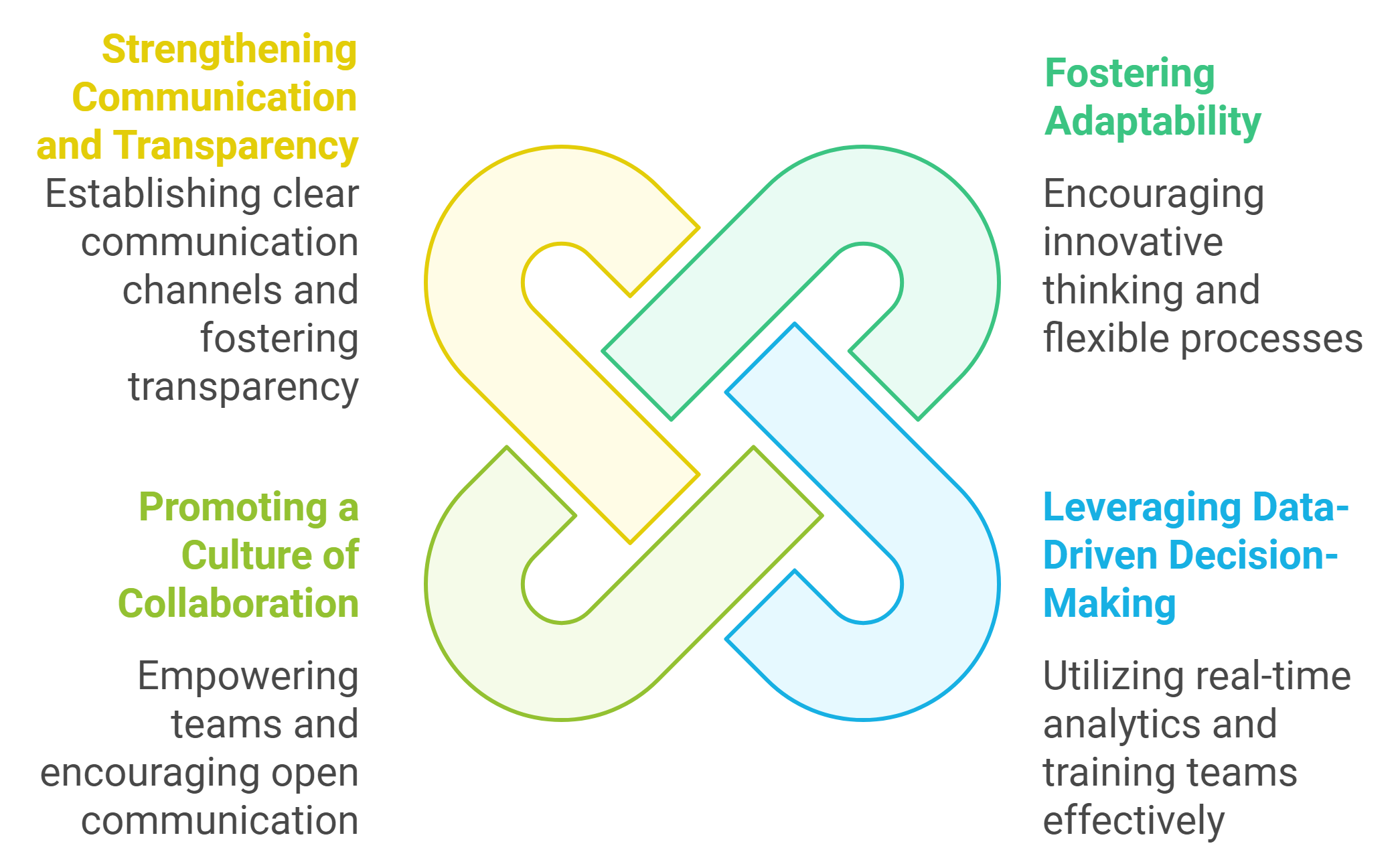
Fostering Adaptability in Leadership
Encouraging innovative thinking and flexible processes.
Adaptability defines your ability to lead effectively during a crisis. When uncertainty strikes, rigid processes and outdated strategies can hinder progress. By fostering adaptability, you empower your team to think creatively and respond to challenges with agility. This approach transforms obstacles into opportunities for growth.
Encourage innovative thinking by creating an environment where experimentation thrives. Allow your team to explore new ideas without fear of failure. For instance, leaders who adopt transformational leadership styles often inspire their teams to embrace change and innovate under pressure. Flexible processes also play a critical role. Streamline workflows to ensure your organization can pivot quickly when circumstances demand it.
Adaptability strengthens your resilience as a leader. It equips you to navigate uncertainty with confidence and ensures your team remains focused on solutions rather than setbacks.
Leveraging Data-Driven Decision-Making
Utilizing real-time analytics and training teams effectively.
Data serves as your most valuable asset during a crisis. Leveraging data-driven decision-making allows you to act with precision and clarity, even in the face of uncertainty. Real-time analytics provide actionable insights that guide your decisions and help you stay ahead of evolving situations.
To maximize the impact of data, invest in training your team. Equip them with the skills needed to interpret analytics and apply insights effectively. A study from Tableau.com highlights the importance of fostering an organization-wide data culture. This habit ensures that every team member understands the value of data and contributes to informed decision-making.
Centralized data strategies enhance your ability to respond swiftly. By consolidating data processes, you eliminate delays and improve accuracy. Effective crisis leadership relies on this proactive approach to maintain stability and drive recovery.
Promoting a Culture of Collaboration
Empowering teams and encouraging open communication.
Collaboration becomes essential when navigating a crisis. A culture of collaboration fosters trust, unity, and resilience within your team. Empower your team members by involving them in decision-making processes. When individuals feel valued, they contribute more effectively and remain committed to shared goals.
Encourage open communication to break down barriers and build stronger connections. Effective communication ensures that everyone stays informed and aligned. According to Bryghtpath.com, clear and consistent messaging is a cornerstone of effective crisis leadership. By actively listening to your team, you create an environment where ideas flow freely, and challenges are addressed collectively.
Empowered teams adapt more readily to change. They work together to overcome obstacles and find innovative solutions. Collaboration strengthens your organization’s resilience and prepares it for the future of crisis leadership.
Strengthening Communication and Transparency
Establishing clear communication channels and fostering transparency are essential components of effective crisis leadership. During a crisis, uncertainty can cloud judgment and disrupt workflows. As a leader, your ability to communicate effectively ensures stability and trust within your organization. Clear communication not only aligns your team but also empowers them to act decisively.
To strengthen communication, prioritize creating structured and reliable channels. These channels should allow information to flow seamlessly across all levels of your organization. For example, implementing regular updates through team meetings or digital platforms ensures that everyone stays informed. Consistency in messaging builds confidence and reduces confusion during critical moments.
Transparency plays a pivotal role in fostering trust. Share insights with your stakeholders openly and honestly. When you provide accurate and timely information, you demonstrate accountability and reliability. According to Bryghtpath.com, clear and consistent communication is a cornerstone of crisis leadership strategies. By being transparent, you encourage collaboration and create a unified approach to overcoming challenges.
Incorporating a human-centered approach enhances your communication efforts. Actively listen to your team’s concerns and feedback. This practice not only strengthens relationships but also uncovers valuable perspectives that can guide your decisions. As highlighted by RWSmith ETC, resilient leaders actively listen and adapt their strategies to meet the needs of their teams. Your willingness to engage in meaningful dialogue fosters a culture of mutual respect and understanding.
Looking ahead, these practices prepare your organization for the future of crisis leadership. By establishing robust communication frameworks and embracing transparency, you create a resilient foundation. This foundation equips your team to navigate uncertainty with confidence and clarity, ensuring long-term success.
Sustaining Resilience Post-Crisis
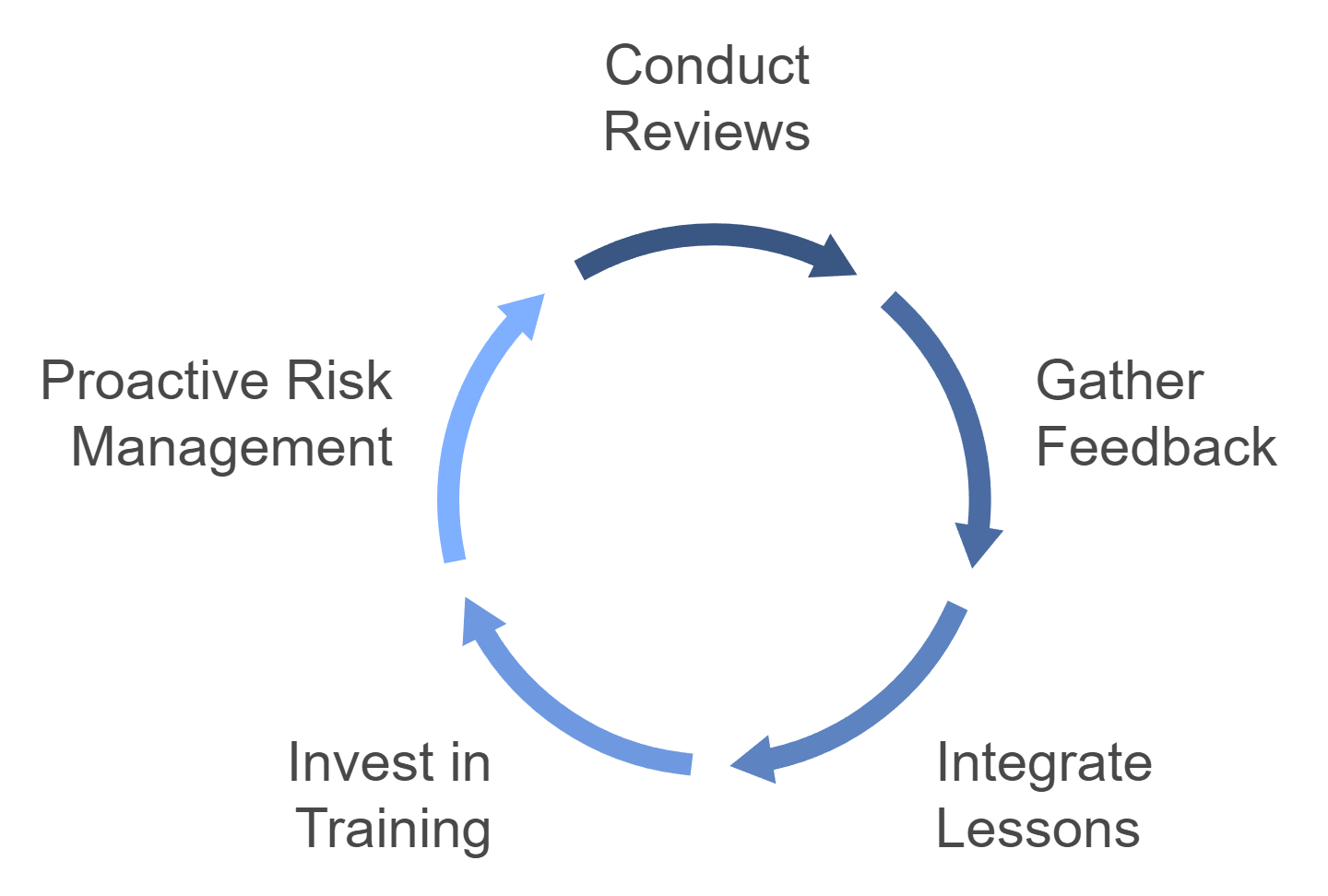
Continuous Learning and Improvement
Conducting reviews and integrating lessons into strategies.
Your journey as a leader doesn’t end when the crisis subsides. True resilience lies in your ability to reflect, learn, and adapt. Conducting thorough reviews of your organization’s response to a crisis provides invaluable insights. These reviews help you identify what worked, what didn’t, and where improvements are necessary.
Start by gathering feedback from your team. Encourage open discussions about their experiences and challenges during the crisis. This transparency fosters trust and ensures that every voice is heard. Use this feedback to pinpoint gaps in your strategies and processes. For example, if communication channels faltered, prioritize creating more robust systems for future crises.
Integrate these lessons into actionable strategies. Document the findings and create a playbook for future reference. This proactive approach not only strengthens your organization’s preparedness but also builds confidence among your team. When your team sees that their input leads to tangible improvements, they feel empowered and valued.
Continuous learning transforms uncertainty into opportunity. By embracing a mindset of growth, you ensure that your organization evolves and thrives, no matter what challenges arise.
Building Long-Term Resilience
Investing in training and proactive risk management.
Building long-term resilience requires a commitment to preparation and growth. Investing in training equips your team with the skills they need to navigate future challenges. Crisis leadership training, for instance, enhances your ability to lead effectively under pressure. It prepares you to make informed decisions and maintain stability, even in the face of uncertainty.
Proactive risk management is equally essential. Identify potential vulnerabilities within your organization and address them before they escalate. Develop contingency plans that outline clear steps for various scenarios. For example, establish protocols for data breaches or supply chain disruptions. These measures ensure that your organization remains agile and responsive.
Training also fosters a culture of collaboration and innovation. When your team feels confident in their abilities, they approach challenges with creativity and determination. This mindset strengthens your organization’s foundation and positions it for long-term success.
Resilience isn’t just about surviving a crisis—it’s about thriving beyond it. By prioritizing training and risk management, you create a future-ready organization that can adapt and excel in any environment.
Resilient data leadership stands as the cornerstone of navigating crises with strength and clarity. By embracing change, you unlock the ability to adapt swiftly and lead decisively. Collaboration and data-driven decision-making empower your team to overcome challenges and seize opportunities. These qualities not only guide your organization through uncertainty but also position it for long-term success. Start anticipating potential threats and implementing these proven methods today. Prioritize resilience as a core component of your data strategy, and inspire your team to thrive in any environment.
See Also
Navigating Obstacles in Effective Data Leadership
Evaluating the Effectiveness of Data Leadership Programs
Transitioning from Data Management to Data Leadership
